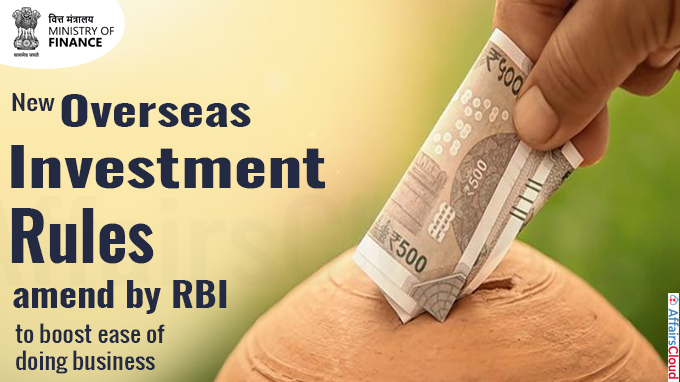
In line with the amendment in the Foreign Exchange Management Act 2015, Outward Investments Rules, officially called, ‘Foreign Exchange Management (Overseas Investment) Rules, 2022’ have been framed by the Government of India (GoI) in consultation with the Reserve Bank of India (RBI). They are applicable w.e.f. August 22, 2022.
These rules has been made by the GoI in exercise of the powers conferred by sub-section (1) and clauses (aa) and (ab) of sub-section (2) of section 46 and sub-section (3) of section 47 of the Foreign Exchange Management Act (FEMA), 1999 (42 of 1999) and in supersession of the Foreign Exchange Management (Transfer or Issue of Any Foreign Security) Regulations, 2004 and the Foreign Exchange Management (Acquisition and Transfer of Immovable Property Outside India) Regulations, 2015, except as respects things done or omitted to be done before such supersession.
- These are notified by the Department of Economic Affairs (DEA), Ministry of Finance.
While, RBI made these regulations in exercise of the powers conferred by sub-section (1) and clause (a) of sub-section (2) of section 47 of the FEMA, 1999 (42 of 1999).
- The notification from the RBI side was issued by its Foreign Exchange Department.
Reason behind these Rules:
i.To simplify the existing overseas investment rules
ii.To with the current business and economic dynamics
Currently, the overseas investment by a person resident in India is governed by the Foreign Exchange Management (Transfer or Issue of Any Foreign Security) Regulations, 2004 and the Foreign Exchange Management (Acquisition and Transfer of Immovable Property Outside India) Regulations, 2015.
Key Provisions under the overseas investment rule:
i.Net worth of a registered partnership firm or LLP:
As per the amendment, the net worth of a registered partnership firm or LLP (Limited Liability Partnership) will be the sum of the capital contribution of partners and undistributed profits of the partners after deducting therefrom the aggregate value of the accumulated losses, deferred expenditure, and miscellaneous expenditure not written off, as per the last audited balance sheet.
ii.The rules guide about the investment by a person resident in India in the equity capital of a foreign entity which is classified as ODI (Overseas Direct Investment).
- Such investment will continue to be treated as ODI even if the investment falls to a level below 10% of the paid-up equity capital or such person loses control in the foreign entity.
iii.Any Indian resident who has acquired and continues to hold equity capital of any foreign entity can invest in the equity capital issued by such entity as a rights issue; or may be granted bonus shares subject to the terms and conditions under these rules.
iv.Any Indian resident whose account is classified as Non-Performing Assets (NPA), or as a wilful defaulter by any bank, or is under investigation by a financial service regulator will have to obtain a ‘No Objection Certificate (NOC)’ from the lender bank or regulatory body or investigative agency before making any financial commitment or undertaking disinvestment.
v.The issue or transfer of equity capital of a foreign entity from a person resident outside India or a person resident in India to a person resident in India who is eligible to make such investment or from a person resident in India to a person resident outside India is subject to a price arrived on an arm’s length basis.
- An arm’s length basis means a buyer and a seller act independently and have no relationship with each other.
vi.Any Indian resident may transfer equity capital by way of sale to a person resident in India, who is eligible to make such investment under these rules, or to a person resident outside India.
- In case the transfer is on account of the merger, amalgamation, or demerger or on account of buyback of foreign securities, such transfer or liquidation needs approval of the competent authority as per the applicable laws in India or the laws of the host country or host jurisdiction.
vii.No person resident in India can make a financial commitment to a foreign entity that has invested or invests in India.
viii.Indian entity having an overseas office may acquire immovable property outside India for the business and residential purposes of its staff.
- An Indian resident may acquire immovable property outside India from a person resident outside the country by way of inheritance, purchase out of foreign exchange held in RFC (Resident Foreign Currency) account; purchase out of the remittances sent under the Liberalised Remittance Scheme instituted by RBI; jointly with a relative; out of the income or sale proceeds of the assets, other than ODI.
ix.An Indian entity not engaged in financial services activity in India may make ODI in a foreign entity, which is directly or indirectly engaged in financial services activity, except banking or insurance, subject to the condition that such Indian entity has posted net profits during the preceding three financial years.
x.An Indian entity not engaged in the insurance sector may make ODI in general and health insurance where such insurance business is supporting the core activity undertaken overseas by such an Indian entity.
Click Here for Official Notification- DEA
Click Here for Official Notification- RBI
Background:
The GoI in consultation with the RBI drafted Foreign Exchange Management (Overseas Investment) Rules; and Foreign Exchange Management (Overseas Investment) Regulations were also put in the public domain for consultations.
Recent Related News:
i.In July 2022, RBI allowed all eligible current account transactions including trade transactions with Sri Lanka to be/may be settled in any permitted currency outside the Asian Clearing Union (ACU) mechanism.
ii.On July 11, 2022, the Reserve Bank of India (RBI) unveiled a rupee settlement system i.e. invoicing, payment, and settlement of exports/imports in INR for international trade INR under FEMA, 1999. It aims to promote growth of global trade with emphasis on exports from India.
About Reserve Bank of India (RBI):
Establishment– April 1, 1935
Headquarters– Mumbai, Maharashtra
Governor– Shaktikanta Das
Deputy Governors– Mahesh Kumar Jain, Michael Debabrata Patra, M. Rajeshwar Rao, T. Rabi Sankar




